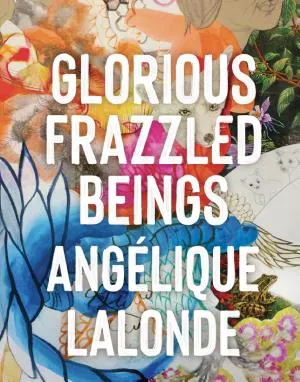
The lady with the big head does not really care about technologies of identity construction and the limited dialectics of culture inherent in dominant practices of person-making. Meaning comes to her through languages of texture and heeding. Quick-sight-and-categorize is not the primary way she has learned to become among others like or unlike her. Therefore she categorizes differently.
There are so many ways of likeness.
I think I hear the lady with the big head whispering. Maybe she is telling me to shut the fuck up? Not for just one hot second, or three timed minutes registered in my meditation app and logged online to be compared with others like me who have become so aware of their mindfulness? Maybe she just keeps saying shhh, shhhh, shhhh, like we used to whisper to William when he was a baby and crying all the time, needing to be soothed by his mothers’ warm soft breaths? Maybe she is saying that it is so hard to hear when we are always stating things, crashing about the multi-voiced world with our so-loud authoritative claims and combustion-engine machinery?
Rupert too had his failures. Ambiguous about being a caring man in this world, he ached for tenderness and found freedom only in the expression of rage and competitive advantage. Rupert wanted to make it and hated the system at the same time. Unable to love, Rupert wanted to sell or smash things, acquire or destroy. He was unable to find any worth in things other than the way they figured into his own wanting. Still, when he was able in rare moments to rest he saw the truth of his longing. Rupert told Carmen he had been jealous of her town, jealous of her joy, wanted to claim it for himself and hated her for finding it and showing it to him, revealing the poverty of his separation.
Marianne is in the world as a continuation of her lineage instead of just as herself. Although she is no longer free in time to exercise her wants and flow her mind into everything through the force of her own curiosity and recklessness, she is free from the constraint of always having to pursue herself and this opens up new ways of embodied being. There is suffering and remarkability in all of it.
My sister knows how to fall in love; she tells me it is easy.
”You sit and focus on your lover’s teeth,” she says. “Watch closely; when you look away again, you’ll notice that you did not notice as the world went by.”
Instead we build her a device from which she can hang upside down, with a long flat back that inverts once she’s strapped herself in. I hang there a lot when she’s not using it, feeling the blood pool in my head, imagining my spine unkinking so more of my life can bubble up through that crazy central nerve cluster that sends messages all through my body, making it so I can know.
Different words for anger. Different words for joy. Different words for sadness. All of them important in understanding the range of a life. Develop happiness by learning the different words for anger. Find humour in the slightness between rage and fury, displeasure and disgust. The itchy place between irascibility and ire. The lofty lunge between vexation and wrath.
Rolling down a hill then rolling up a hill. You have to go over it if you want to get to the top and see what’s on the other side. Isn’t the downward side the cruising part? Like the first part is all struggle and you work your ass off and shit and then you just sit back and enjoy the scenery? Why the sense that once you’re over the good part’s done? Kick your feet up, Rita-Mae, honey, the tough part’s over, no more bullshit now you get to unapologetically squeal and fist pump all the way to the other side!
Meeru is a close observer of people. She has to be to make her sales, to help people pick out their wedding rings and mementoes. She has to develop a deep understanding of how to counsel customers so that they are able to turn little pieces of metal and rock mined from the earth in mostly inhumane and ecologically devastating ways into symbols of lasting intimacy. Meeru’s vocation is to tease out the bonds of love latent in these small glittery things. Our own pieces of the stars, Meeru thinks.
Tina’s children overwhelm her, even though she loves them. She wonders if everyone is overwhelmed by their children, or just mothers, or mothers and fathers, just in different ways. It seems easier for fathers to turn it off somehow, not be consumed by them. Whatever else Tina is doing, there is always a small bit of guilt gnawing at her that she is doing it away from the children, that by not being there and giving them all of herself, she is perhaps harming them a little. Or not doing her absolute best by them.
For weeks she fumed and sputtered, biting at her nails, going around things in her head convinced of what she’d suspected all along—that his uncertainties and self-interest would rob her of a motherhood she had once waffled about wanting, but that was now the thing she desired most to make real.